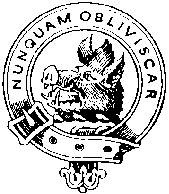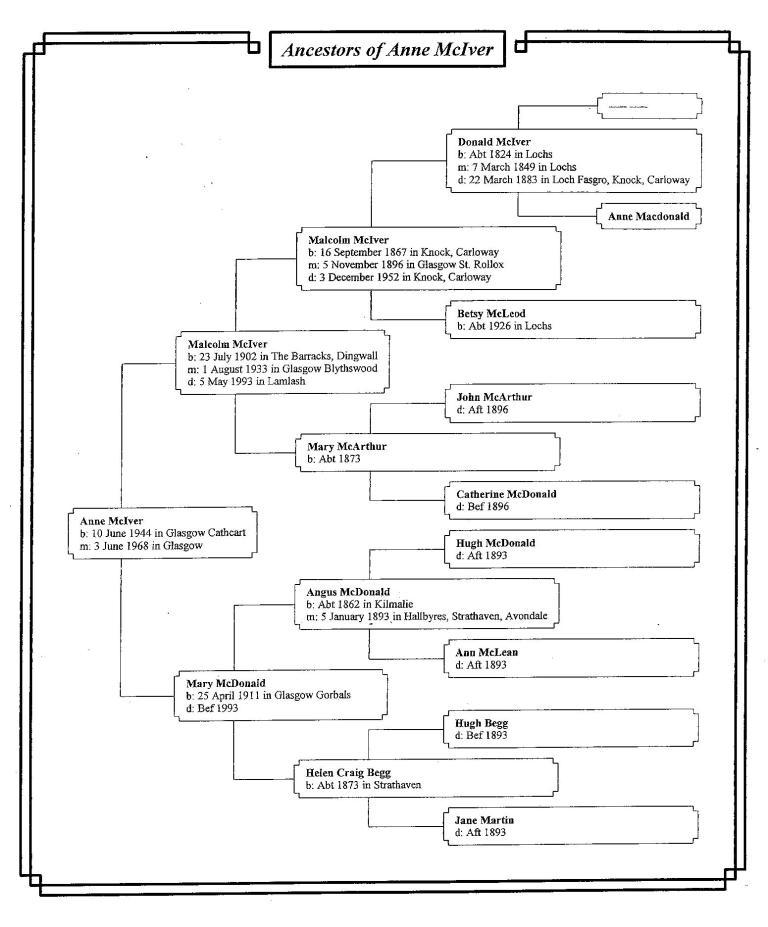

The History of the Clan
The Clan Iver, known as the Clan Iver Glassary, from Glassary in Argyll, are claimed to have formed part of the army of Alexander II which conquered Argyll in 1221, and for their services received lands in the district. They had come from Glenlyon district, and in Argyll their principal possessions were Lergachonzie and Asknish, and other lands in Glassary and Cowal.
The history of the clan after their obtaining lands in Argyll is very obscure, and it is asserted that in the thirteenth century branches of the family left Argyll and settled in Lochaber, Glenelg, and Ross, and it would appear that the Macivers were for sometime a "broken" clan, but in 1564 they appear to have recovered some of their former strength for in that year Archibald, 5th Earl of Argyll, renounced all claims to the calps of any of the Clan Iver, Iver of Lergachonzie agreeing to give the Earl his own calp.
Duncan, who succeeded as chief of the clan about 1572, is described as of Stronshiray and Superior of Lergachonzie. In 1685 Iver of Asknish and Stronshiray was forfeited for aiding Archibald, 9th Earl of Argyll, in rebellion. Following the Revolution of 1688, Archibald, 10th Earl, restored the estates of Iver to his son Duncan Maciver on condition that he and his heirs should bear the name and arms of Campbell. Iver was thus the last chief of the Macivers, and Sir Humphry Campbell who died in 1818 was the last in the male line of Duncan Maciver of Stronshiray.
The branches of the clan in Argyll all appear to have assumed the name Campbell, but those in the North and in Lewis retained the name of Maciver with greater tenacity."
In the 13th century Iver Crom possessed some lands in Argyllshire and it is claimed he conquered the lands of Cowal for King Alexander II. He possessed the lands of Asknish, Lergachonzie and Glassary in Cowal. His son or grandson, Malcolm MacIver had lands in 1292 and about 1500 Iver MacIver of Lergachonzie was chief of the clan. He had three sons; Duncan, Charles and Iver Ban. A descendant of Charles was chief about 1572 and was designated "of Asknish and Stronshiray". His son, Iver, was forfeited in 1685 for his part in the rebellion by Archibald, 9th Earl of Argyll.
After the Revolution in 1688 the
10th Earl restored the estates of the Clan Iver to Duncan, son of Iver, on the
condition that he and the heirs of the family of MacIver should assume the name
and bear the arms of Campbell. Sir Humphray Trafford Campbell who died in 1818
was the last male descendant of Duncan MacIver of Stronshiray. Other families of
MacIvers assumed the name of Campbell including the MacIvers of Ardlarach who
also adopted the name at about 1688, the MacIvers of Pennymore on Loch Fyne, the
MacIvers of Glassary and the MacIvers of Ballochyle. The MacIvers in the
Gairloch region descend from a MacIver from the Argyll area, some of the
MacIvers of this area remained MacIvers while others changed their name to
Campbell.
The 20th and 21 th Century in France
Joanne Mc Iver niece of Anne McIver, little girl of Malcom McIver of the Logs (direct descendant of Donald McIver). It began the bagpipe at 6 years. She would have liked to learn the flute but there were no professors on the Island of Arran. The only choice at the time was the large bagpipe or the clear case within a pipe band. It thus has chois the flute, being the instrument approaching the most flute.
At the 11 years age, it could take courses of piano, then - miracle - a
professor of wind instruments was engaged on the island. He came once per week
since Kilmarnock by the ferry. It could learn the flute starting from the 12
years age.
At that time, it was very attracted by the classical music, and decided to make
studies of musicology at the university of Glasgow (of 1989 to 1993) where it
specialized in flute and composition. Then after the university, it realized
that makes some, it did not want to work in the classical music. A little lost,
it had opportunity of working in the administration of the national orchestra of
Scotland, it is there that it made the meeting of Christophe Saunière.
Then, it arrived in 1995 to France where it began its professional life with odd
jobs like keeps of child after the school, then it worked in a shop of sale of
disques/CD' S.
Then, it finds a work in a house of publicities (horrible - it disadvises this
work with everyone, but it was beneficial to him for its French), to finish then
in a house of music publishings. During all this time, she plays of the music,
bagpipes, flutes, for marriages, recordings or small concerts with her husband
Christophe Saunière, but sufficiently to enter the world of the intermittency of
the spectacle. She felt very frustrated since her arrival in France, because its
dream was of living music.
All this until 2000 when Eilidh, his/her daughter, was born, and it then took a
parental leave with the goal to again work its instruments and its music and to
assemble a duet with Christophe Saunière her husband. At the time of its
vacation maternity, the publisher for which she worked had been obliged to
restructure E she was laid off.
This dismissal will be rather a good for it since it intended to leave this work
to lead a career of artist to the sides of her husband Christophe Saunière.
The duet started by especially making the event-driven one with one limps which
was called “Ground of Scotland”, but which does not exist to date any more, and
small �� small they could go more towards the concerts. Today, Joanne shares its
time between the composition, the recordings, teaching and the concerts
throughout the world. It will compose a collection of melodies for the bagpipe.
who will become finally a disc entitled Leaving Arran. Many concerts follow the
exit of CD, both to France and abroad (there will be a round in Scotland).
On scene, Joanne plays of the large bagpipe (highland bagpipes), the bagpipe of
room (Scottish smallpipes), the flute, the Irish flutes and she sings into
gaelic and a Scot. In 2004 another album follows, The Dwarfie Stone, there too
appear only of the compositions of Joanne, then in 2006 the third album
“Glenfinnan to Glasgow”. She works now on a new project of tale of her native
island illustrated musicalement by personal compositions.
Joanne is sonneuse Embassy from Great Britain to Paris.
A few years ago, on their way of Bohemian, the duet ended up crossing the way of
a person impassioned by their music, Christophe Bertandeau who will become one
their friends. Wanting to honour this great friendship which not binds them by
blood but by the heart and thanks to its enthusiasm for the Scottish culture, he
proposes in Joanne to create the McIver Clan in France.
To date, the clan counts in France, 5 members official. We would be happy of
being able to still widen it.
Do McIvers de France or besides (of blood or heart), you feel your heart to have
the need to belong to this clan? You express by contacting us with
clan.mciver@free.fr
Tartans McIver
|
|
|
|
Family tree not very clear for the moment :

The Clan's members in France
Christophe Saunière :
Talented and famous harpist, his course is atypical…
After having played in French symphonic principal trainings (Orchestra of Paris,
Orch. national of Lyon, Orch. of Bordeaux-Aquitaine, Lamoureux…) while playing
of low and the battery in various rock'n'roll groups, it becomes then Harpiste
of the National orchestra of Scotland, where it takes residence during 5 years.
It benefits from it to redécouvrir its Celtic roots and to accompany the
sonneuse one by bagpipe Joanne Mc Iver, while connecting the rounds in Europe,
in Japan and the USA.
Living now in France, it is devoted to the compositions of Joanne McIver,
meetings of recordings, Jazz, classical music, World, it played
in European principal trainings of modern music (EIC, Short-circuit, Klangforum
Wien…)…
Its CV are impressive… it was in particular Harpiste of the B.O of films
“Star Wars, episode 1”, “Titanic”, “the English Patient”, “Alien 4” etc…
It recorded an about sixty discs! One can even see it playing the comedy in film
of Philippe Béziat “Musica da camera”.
Calum McIver :
Oldest son of Joanne McIver and Christophe Saunière.
Eilih McIver :
Girl junior by Joanne McIver and Christophe Saunière.
Christophe Bertandeau :
Friend of Joanne and Christophe, raises bell ringer of Scottish bagpipe, and
bell ringer of gaita Galician.